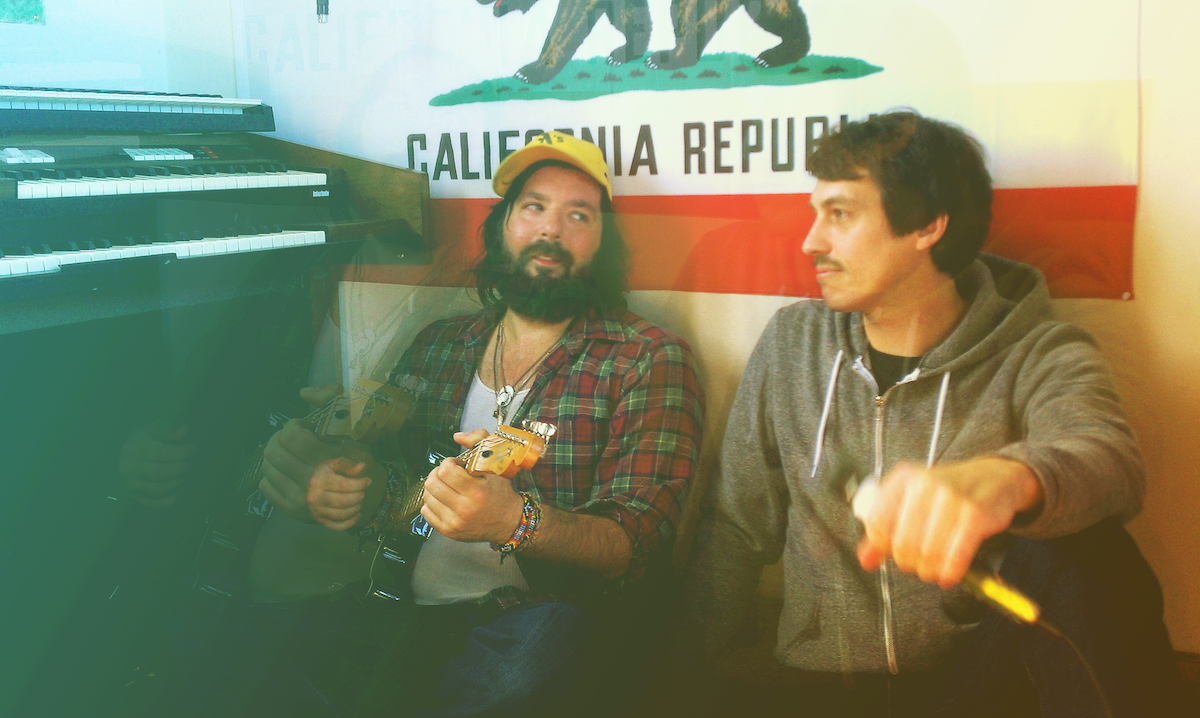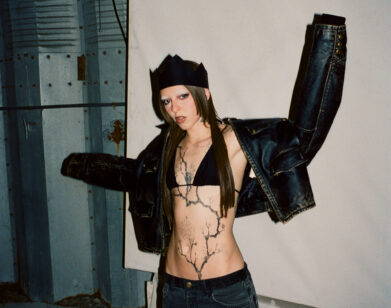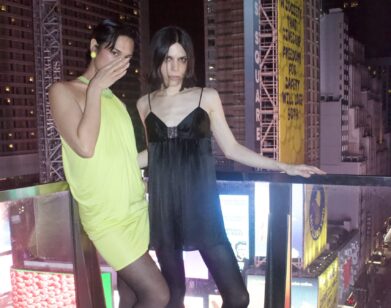Exclusive Video Premiere and Interview: ‘The Sky is Black,’ Window Twins

ABOVE: WINDOW TWINS. IMAGE COURTESY OF ALISON MORITZ
Whether it’s the last of the ’60s spilling into the water supply or too many Pure Moods commercials watched late at night, San Francisco’s garage rockers have developed a psych-leaning DIY scene that’s like nowhere else in the country. One of those bands, Window Twins—whose sophomore LP Wish drops October 16 via Volar Records (vinyl) and Crash Symbols (cassette)—is made up of two guys whose other bands have been indispensible to its growth.
While Tim Cohen is probably best known for fronting The Fresh & Onlys, and Jon Bernson for the experimental pop trio Exray’s, Wish mixes lo-fi electronics with psychedelic folk for something weirder and harder to pin down than either one. Below, you can check out our premiere of the infectious dark-pop track “The Sky Is Black,” along with its accompanying video from Fabien le Gourrierec, who assembled the clip from a short by Australian director Tracey Moffat called Nice Coloured Girls. Says le Gourrierec:
“Moffat is Aboriginal, and through this movie Moffatt shows aboriginal women as powerful and aware of their own subjugation. When I edited the video for Window Twins, I cut and kept the artsy form of the movie—the painting scenes, the contemplative strolling in the streets… I felt like they work perfectly with the song. There is no hidden message, just some perfect images for this particular voice and these swinging arrangements.”
Also below, check out Interview‘s conversation with Bernson, who talked about how SF compares to NYC, how the scene has changed, and what it’s like working with Tim. As is inevitable with Bay Area-centric interviews, Mexican food becomes involved.
NATHAN REESE: What’s the backstory between you and Tim Cohen? How did you meet, and what’s it like working together?
JON BERNSON: We met about ten years ago on a tour booked by a guy named Ian Brennan. He collected a group of eight West Coast songwriters and booked a string of East Coast shows for us to play as a collective. It wasn’t comfortable, but it forced everyone out of their bubbles and into this big Winnebago of ideas and influences. After the tour, Tim and I ran into each other at a party, and a mutual friend told us to start a band together. This friend offered to be our drummer. Long story short, we decided to give it a shot. The funny part is that our friend didn’t show up to the first session. Tim and I were left to our own devices, and the devices became Window Twins.
Our dynamic together is pretty focused, and the roles are flexible. In the big picture, both of us do the same thing: write songs and record ourselves playing various instruments. I’d say the person who feels more confident doing a particular part usually gets the job.
Sometimes it comes down to taking turns. On “Good People,” he wrote the bass line, hook and vocals, then asked me to sing instead. I changed some lyrics and then tracked it one octave down. On “Two Left Feet,” I wrote the chords and sang the chorus vocals, then passed it to Tim. He wrote the verse lyrics and recorded vocals on his own, then gave a me a CD with the tracks and I mixed them together. No rhymes or reasons. The process is collaborative in unpredictable ways, and I think that’s what makes Window Twins special.
REESE: As a San Francisco transplant, how do you like living on the West Coast?
BERNSON: The weather is not to be underestimated. I’m from New York, where I was prone to seasonal depression in the wintertime. I lived in Montana and developed a psychopathic relationship to mosquitos and black flies. I lived in England, where the sun disappeared for months at a time. Here, the fog is more occasional. It offers mental ballast. The taquerias never get old, and the rise of the salsa bar is a revelation. Oakland has the same vibe as the Mission had before the European conquest.
REESE: How has the music scene changed since you’ve lived there?
BERNSON: San Francisco seems to attract innovators, whether they deal with music, art, theater, politics, ideas, etc. The transitory nature of San Francisco has taught me to jump on opportunities when they present themselves, because conditions change quickly. Bands form and break up. Venues open and close. Collaborations weave in and out. I’ve learned to see an open situation as temporary. I try to make the most of it, or pass it on to someone else. The only negative I see is the cost of living. Many artists come to the Bay to soak up the juice and build their foundation, but find it more practical to live in another part of the country once they’re more established.
REESE: What’s the story behind the album title?
BERNSON: Wish has been the working title from day one. Wishes are important. Don’t let them down. Easy. Or at all.
REESE: Tell me about the new album. How was your experience different than with I’m This Tall City?
BERNSON: When we started making I’m This Tall City, Tim and I barely knew each other. We weren’t intending to make an album. Over about six months, we filled a bunch of reels on our 388s, transferred them to computers, and eventually collaged them into songs. Wish was different because we began with the intention of making a record, and put a greater focus on the songwriting. Window Twins may be a side project, but Tim and I have been making music together for years, and I think Wish is the record that finally does justice to what we’ve been driving at.
REESE: How do you think “The Sky Is Black” fits on the album, specifically?
BERNSON: That’s the first Wish song we recorded, but we didn’t like our initial vocal ideas, got stuck, and stopped working on it. I opened up the track one night after a long time away from the mix, got an idea, tweaked the structure of the song, and wrote some new lyrics. The rolling drums and unrelenting quality of the chords got me thinking about determination, which keeps a close eye on one’s wishes.
REESE: How is Window Twins different from Exray’s or your other projects?
BERNSON: One time, we spent a night in Tim’s kitchen with rough instrumental mixes playing on the stereo as we freestyled melodies and lyrics into a tape recorder. Don’t think I would do that with anyone else. It was understood that most of the ideas would be terrible, but that we would discover something unique by hitting it like rappers for a night.
As I was saying earlier, Window Twins feels different to me because we do similar things. Other groups I play in are based more on the attraction of opposites. Of course, Tim and I have many differences, but I’m talking big picture. Also, Window Twins is largely a recording project. We don’t do many shows. Because of the long spans between sessions, we have the benefit of a wide-angle lens. We have time to soak in the rough mixes, exchange a bunch of texts, and get on the same page before we go back into the studio.
REESE: Considering the many genres and influences on Wish, how would you describe the record to someone who had never heard your music before?
BERNSON: Freedom comes to mind.
REESE: What’s your favorite own way to listen to music, and how would you like the album to heard?
BERNSON: Crank it up at your wedding, bring it to your local opium club, pipe it through the elevator at work. As long as you’re not listening through a neighbor’s wall with the vacuum running, you have my eternal gratitude. I love hearing music on a great pair of headphones. Beyond that, I’m pretty open. LPs in the kitchen. Tapes in the living room. Laptop by the bathtub. They’re all beautiful. The car is my second studio. I couldn’t mix an album without Honda speakers. They’re like a second set of ears. The only thing I haven’t gotten into is playing music off a phone or iPod. I like hearing the world when I’m walking around.
WISH IS OUT TUESDAY, OCTOBER 16. FOR MORE ON WINDOW TWINS, VISIT CRASH SYMBOLS OR VOLAR RECORDS‘ WEBSITES.






